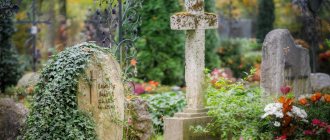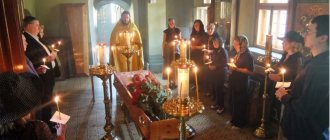According to Orthodox custom, the 9th day, counted after death, is given great importance. At this moment, the soul, which has already seen all the joys of the Kingdom of Heaven, appears for the first time before the Lord. Memorial words and prayers heard on this day at a special memorial meal can help the soul of the deceased. They can influence where exactly - in heaven or hell - the soul of the deceased will await the Last Judgment. Therefore, it is so important to remember the deceased, remember the good deeds they did on earth, and sincerely and often pray for their repose. This article contains answers to the most popular questions about how to spend nine days correctly.
What do 9 days after death mean in Orthodoxy?
This is a special date that means a lot to the deceased and his relatives. It is believed that the soul after death spends the first 3 days saying goodbye to the people and memorable places left on earth. On the fourth day, her guardian angel helps her ascend to heaven to show all its splendor. There the spirit of the deceased rests from earthly suffering. Then they show him all the sins he committed during his stay on earth. On the 9th day, the soul appears before God and, after a conversation with him, goes to hell to undergo trials (ordeals) and see all its horrors. On the 40th day, the spirit of the deceased again appears before the Almighty, this time for a private trial - a decision about where he will live in eternity - in heaven or hell. It is believed that 9 angelic ranks intercede at this time with the Lord for the soul of the deceased.
The importance of nineteenth is that the place of the soul of the deceased at this time has not yet been determined. It is already difficult for the deceased to influence this determination. His living relatives and friends can still help with sincere prayer and good memories of the deceased. Prayerful support from family and friends is extremely important for the soul going through ordeals and trials from the 9th to the 40th day. How the spirit of the deceased can overcome sinful temptations and torments will determine whether the soul will be cleansed of sins and be able to enter heaven. This decision is also influenced by how many people and how often he is remembered. Do they remember him with kind words or speak about him with resentment and anger. Therefore, it is extremely important to forgive all the grievances that came from the deceased during life, and, in turn, ask him for forgiveness.
Funeral kutia
As has already become clear, the main dish, that is, what is remembered for 9 days, is kutia. Each region has its own unique food preparation traditions. But the main components are grain and honey. The following cereals can be used in cooking:
- millet;
- rice;
- corn;
- wheat.
Let us note that it is not by chance that grain is chosen to prepare this dish. It has a sacred meaning. What is meant here is that the seed dies when cooked, just like a person dies. The latter can be reborn in the Kingdom of Heaven in a new appearance. To wish the deceased a heavenly life, poppy seeds and honey are added to kutya.
Raisins and nuts are not always added to this lean dish. This is because they symbolize healthy life and well-being. Symbols of heaven are sweets such as honey and sugar. They are also added to kutya. Don't turn a funeral dinner into a waste of time. This time is reserved for consoling loved ones and remembering the deceased.
How to count 9 days for a funeral
When organizing a wake, relatives of the deceased often wonder how to correctly count 9 days for the deceased. Some people think that the countdown should be from the date of the funeral. In fact, the 9th day is counted from the date of death, including it. At the same time, they do not take into account the time of day at which the person died. The day of the funeral has no effect on the counting of memorial days. In some cases, for example when investigating the circumstances of a death, the body may not even be buried by the 9th day. Regardless of this, it is necessary to order a memorial service in the church and carry out all memorial events in the name of saving the soul of the deceased.
How can you help the soul of the deceased?
Close and dear people can help the soul of a loved one, starting from the day the soul departs. The funeral service for the deceased takes place in the church and a sorokoust is ordered - a commemoration of the deceased, which is heard at every liturgy. If there is no daily service in the parish church, then the magpie must be ordered in a monastery or any church with daily liturgy. This remembrance continues until the fortieth day, on which a special prayer rite must be served - a requiem. During these forty days, in addition to church prayer, home (cell) prayer is obligatory for relatives. The Psalter is read for the deceased, special prayer chants for the deceased, there are special texts of rules about deceased relatives, spouses, and children. You can read the canon “On the One Who Died.” Great help can be provided to the soul if several people begin to simultaneously pray for the deceased, especially if they mark this prayer with action - they need fasting, giving up bad habits, and entertainment.
Is it possible to hold a funeral earlier or later?
If it is not possible to gather at the table on the 9th day after death, the memorial meal can be arranged a little earlier or later than this date. You can move the date of the funeral to the next weekend so that working relatives can attend. You can adjust the date due to fast days, if one of the invitees is not ready to eat only fast food. In addition, funeral tables are not set on the Bright Resurrection of Christ and the following Bright (holiday) week. Otherwise, the rules for holding nine days differ little from the rules that have developed for other commemorations.
What to do with a memorial offering
When accepting the gift, they certainly wish the Kingdom of Heaven to the deceased. It is best to use the items received in everyday life, remembering the deceased each time. This is exactly what they are designed for. You should not be afraid of the negative energy of a funeral; it does not accumulate in these objects. But still, if you don’t want to use such things and keep them at home, you can give them away. For example, you can bring it to the temple and put it on a special table for alms, give it to someone or give it to those in need. The Church does not see this as a sin.
Almost any of the memorial alms carries the most important task - a reminder of the deceased and a request to pray for his repose. Therefore, it does not matter what form it takes (a sweet treat, a spoon from a funeral, or a personal item of the deceased). The deceased no longer cares about worldly goods and material objects; the only thing his soul asks for is remembrance and sincere prayer. Of course, you should not strictly adhere to the “severe requirements” of superstitions. This will not benefit either the living or the dead and, moreover, is not approved by the church. However, sometimes, for the sake of peace of mind and a sense of “correctness,” it is worth giving in to older relatives and allowing them to follow the established “rules” that are familiar to them.
Ask Father No. 83 (When to distribute the deceased’s belongings, how to spend 40 days after death)
Rules for holding a wake for 9 days
- For 9 days, they usually do not send special invitations or invite guests. Often on such a day only relatives and closest people gather at the table. However, anyone can join such a meal. You just need to clarify before the event starts where and when it will take place. This may be important if the wake will be held in a cafe or restaurant. In this case, all places are calculated and paid for in advance.
- At the funeral meal, it is important to talk only about the good deeds of the deceased, without remembering anything bad about him. It is believed that this determines which way the scales will swing: good deeds that lead the soul to heaven will outweigh, or evil deeds that cast it into hell. So that everyone who comes can say something kind about the deceased, it is customary to give the floor to everyone gathered at the table in turn. They usually start with the closest relatives, and their friends and acquaintances continue the story about the deceased.
- According to the Orthodox tradition, endless tears, loud groans, hysterics and sobs are displeasing to God. They prevent the soul of the deceased from leaving the earth and going to the afterlife. The Church commands to release the spirit of the deceased with humility and peace, so that he can calmly continue his journey into eternity.
- It is not customary to throw away food left after a funeral table. Even crumbs scattered on the table, folk custom says, should be given to the birds so that they can quickly convey to the Lord a prayer for the deceased.
Funeral lunch. Basic rules of behavior
How to remember the dead for 9 days? Lunch should start with the first course. Usually it is borscht. Also on the funeral menu there is porridge, often pea. This dish is served with cutlets, fish or poultry.
Many people are interested in how to remember for 9 days and what should be served? Now let's try to understand this issue. The menu at a wake must include porridge (often pea), accompanied by cutlets, fried fish or poultry.
The receiving party chooses the cold appetizers themselves. As for drinks, there should be either compote or uzvar on the table. At the end of lunch, thin pancakes (with cottage cheese or poppy seeds) or pies with sweet filling are served.
How to properly set the table
After prayer, the meal begins with a special ritual dish - kutya (sochiva). It is prepared from grains (wheat, rice, corn, millet, etc.). This dish has a sacred meaning. The grain dies when cooked. Honey, poppy seeds, raisins, jam, and nuts, which are used to flavor kutya, symbolize heavenly pleasure. They are placed on the funeral table as a wish for the newly departed to have a heavenly stay in eternity. If it is not possible to consecrate this ritual dish in church, it is sprinkled with holy water three times at home.
In some regions and districts, jelly, compote, pancakes and pies are still considered obligatory dishes. In fact, the church does not determine the menu of the funeral table with such categorical precision. Theologians insist that commemorations should not incline those who attend them to gluttony. Therefore, you should choose simple dishes for them, without any special culinary delights. The number and choice of dishes depends only on the desires and tastes of those who organize the funeral meal. It is only important to remember about fast days. There is no need to worry if the commemoration took place on a fast day. There are many delicious Lenten dishes that make it easy to put together a good meal. Taking all this into account, fast or lenten soups, main hot courses, various snacks, and sandwiches are often placed on the funeral table.
Alcoholic drinks at the funeral table are condemned not only by the church, but also by psychologists. Relatives already suffering from the stress associated with the loss of a loved one can aggravate their gloomy state with alcohol. According to psychologists, such libations have a detrimental effect on the psyche of the mourners.
When things of a deceased person are given away
Many superstitions have accumulated around the belongings of a deceased person. For example, it is believed that things cannot be touched or given away until the 40th day from the moment of his death. That you cannot leave the deceased’s belongings in your home, use them or wear them. You cannot enter his room and clean it. In fact, theologians do not insist that all things must be given away. They also do not indicate the exact time when this should be done. Some priests say that those items that are destined to become alms can and should be given before the 40th day. Indeed, at this time the soul of the deceased requires special prayerful commemoration. During these periods, it is decided where exactly the soul of the deceased will end up: in heaven or hell. The grateful prayers of the people who received these things will help the spirit of the deceased.
Only the heirs can decide what to do with certain things left behind by the deceased. At the same time, it is important not to fall into superstitions. There is no need to rush to give away everything you have immediately after the funeral. There is no need to strive to give away 40 things on the forties. It is important that the result of this alms be a sincere prayer for the repose of the deceased. 40 days after death is a time that is especially painful for the relatives of the deceased. Important life decisions are usually not made at this time. But, if suddenly a person appears who needs a specific item or several things that previously belonged to the deceased, and there is no reason to keep it in the family, you definitely need to give it away. In this case, there is no need to specifically wait for the 40th day. To ensure that things continue to serve people, you can turn to special collection points for things for those in need. Of course, all items intended for donation must be clean and in good condition. Therefore, there is no sin in washing the deceased’s belongings before donating them to those in need. Broken and dilapidated things that can no longer be used, of course, will simply have to be thrown away.
Memorabilia of the deceased should certainly remain in the family or be given to those people who would like to take them in memory of him. They can and should be worn, they can and are important to use. The superstition that the negative energy of a funeral or some sins of the deceased can transfer to things and bring trouble to the house does not in any way relate to the Orthodox faith. By frequently using these items, people will more often remember the deceased and offer prayers for his repose. It is only important that these items are not forgotten, not put away in closets and pantries, because this is the path to oblivion of the deceased person. You should also not refuse to clean the room of the deceased. The interior covered with a thick layer of dust only speaks of disrespect for its spirit. Even in those places where everything remains “as in life,” in the cells of deceased holy elders or in museums of famous people, repairs and cleaning are certainly done.
Rules of behavior at funerals
You shouldn’t throw a luxurious feast at a wake that boils down to gluttony. You cannot turn a funeral meal into a merry feast. But you shouldn’t indulge too much in grief. It is best if the funeral words are spoken quietly at the table, if the memories of the deceased person are kind and bright. To help the soul and not harm it, priests advise starting and ending the meal with a common prayer. It is important not to remember under any circumstances the bad deeds or harmful character of the deceased.
Basic mistakes and rules
Commemoration of the dead must be carried out in accordance with established religious dogmas. Orthodox and Muslims try to honor established customs in order to ease the fate of the person who has left this world. It is important to know how to celebrate 9 days - from the moment of death or funeral.
Commemoration of the deceased should be held at a modest table. Food should not distract those present from prayers and turning to God. Women should not buy a new dress or visit a hairdresser. Funerals and commemorations are not the events when you need to pay attention to your appearance.
The commemoration should take place in an atmosphere of general grief and sadness. There should be no swearing or loud statements. You should not talk about extraneous topics. All time should be devoted to quiet conversations about the deceased and prayers for him. Alcoholic drinks are not welcomed by Orthodoxy. Everyone knows the negative consequences of excess libations. The funeral should be celebrated at home or in a cafe, but under no circumstances in a cemetery.
All religions have their own funeral traditions, which are sacredly observed from generation to generation. Every person suffers when they lose loved ones, so they want to alleviate the mental pain as much as possible. Rituals of remembrance help not only to quickly cope with sadness, but also to ease the fate of the soul of the deceased in the next world.
What should relatives do for 9 days?
It is best to start the day with morning prayers, in which you must certainly remember the deceased. After this, it is advisable to go to the temple. There it is important to order a memorial service, a prayer service for the repose of the soul of the deceased. You can ask to consecrate the kutya prepared in advance for the funeral table. As a rule, there is a memorial table in the left half of each temple. On it, in front of the crucifix, there is a rectangular candlestick for many candles (round candlesticks are placed in the temple for candles about health). Candles lit on a memorial candlestick become a symbol of common prayer. The more people ask the Lord to forgive the sins of the deceased, the greater the chance of his soul going to heaven. The flame of candles enhances the common prayer, as if illuminating the path of the spirit in the darkness of the afterlife.
Candles in church are lit from other candles or, if no candle is lit, from a lamp. You cannot use matches or lighters you bring with you to light them.
If it is not possible to invite a priest to the funeral, you can pray yourself. For this purpose there is a special rite of lithium for the laity. This version is read at home (privately) or in the cemetery. After all, the most important thing that relatives can do for the deceased is to pray for his soul. Prayers on the 9th day are expressed in a request to the Lord, so that when meeting him the soul will find consolation and joy, and not shame and sorrow about an unworthily lived life. Of course, to have sufficient power, such a prayer must be sincere, coming from people who live with faith and reverence for God.
According to Christians, on the 9th day, as on other memorial dates, it is customary to give out alms with a request to remember the deceased in prayers. This charitable deed can take any form. This is not only monetary charity for the poor, not only bags of sweets for guests who came to the funeral and other people. For the same purpose, you can send money to an orphanage or nursing home, give some of the deceased’s belongings to the poor, leave money in special boxes that are placed around churches to collect alms for repairs, church construction, or for other purposes. In addition, you can leave food on a special table in the church. People most often bring food to the temple, which does not spoil for a long time. For example, flour for baking prosphora, Cahors, cereals, pasta, jam, fruit, etc. Some of these products will be distributed to the poor, others will be useful for temple holidays and other events. If there is no money for alms, you can simply offer selfless help to weak people. Guests who come to the funeral are often given an item as a keepsake in memory of the deceased. This could be a spoon, a cup, a small towel or anything else. You should definitely use such a thing; it does not carry any negative energy. The purpose of this gift is to remind people of the deceased as often as possible. Constantly using such a gift, a person will often remember the deceased and pray for his soul.
Behavior in church
We have already figured out how to remember for 9 days. For Orthodox loved ones, it is a prerequisite that they be present at the service on the occasion of 9 days.
All people light candles for the repose of the deceased according to this plan:
- First, go to the icon, near which there are candles for the repose. It usually depicts the crucifixion of Jesus. Cross yourself.
- Light the previously purchased candle from other burning ones. If they are not there, then you can use the fire from the lamp. Under no circumstances should you use matches or lighters in this matter.
- Place a lit candle in an empty space.
- Next, ask God to rest the soul of the deceased, be sure to give the full name (the one with which you were baptized).
- Cross yourself, bow, move away from the lamp.
The candles that are placed in the church symbolize a collective request for the deceased. When praying for the soul of the deceased, send requests to God for the mercy of a sinful person. The more people who plead for his forgiveness, the more likely it is that he will receive forgiveness. You can ask both from the Holy Saints, and from the angels and God.
Is it possible to go to a cemetery for 9 days?
Theologians believe that if possible, it is not only possible, but also necessary to go to the cemetery on this day. The superstition that on the 9th day after death, visiting a cemetery can somehow harm the soul of the deceased or his relatives is just a harmful misconception that has nothing to do with the Orthodox Church. However, you shouldn’t worry if you can’t come to the grave on that day. It is important to remember that the most important thing for the soul of the deceased is the prayers of his family and friends, which can be offered not only in the cemetery, but also in church or in private (at home). Usually on the 9th day, the grave is cleared of accumulated debris, lamps or candles are lit and prayers are read. You can invite a priest to conduct the litia. Or, if for some reason this failed, it is worth reading the lithium for the laity yourself. If there is no intention of going to the cemetery on this day, such a litiya can be read privately, at home, before the funeral meal.
Flowers are most often brought to the cemetery. It is better not to leave food at the grave. If you want to distribute it to the poor, it is better to give it directly into the hands of needy people. Or put it on a special funeral table in the church. On the way to the cemetery, you can distribute funeral treats to people you meet, consisting of sweets, pies, cookies, gingerbread, etc. At the same time, the name of the newly deceased is called and asked to be remembered in his prayers.
A lit lamp cannot be left on the grave so as not to cause a fire.
Tithes in commemorating the deceased are extremely important.
The funeral table set on this day means that all the relatives and friends of the deceased gathered at the meal not only remember him, but sincerely strive to help him. A memorial service ordered in a church, the prayers of relatives and friends warm the soul of the deceased. They support her in the difficult trials and ordeals that come after the 9th day, help her to cleanse herself of sin and go to heaven. Do they not go to the cemetery for 9 days?
Funerals for the unbaptized and suicides
All church commemorations are performed for people who were baptized in the Orthodox Church. Unbaptized adults or those who committed suicide deliberately refused the patronage of the church, so they are not prayed for in churches. They are not commemorated at the liturgy; funeral services cannot be held in churches.
There are exceptions to this rule:
Baptized suicides who are registered in mental health centers always have a funeral service in church, there is church prayer for them, only the relatives need to bring a certificate about the mental state of the deceased. Unbaptized infants do not have a funeral service, and there is no personal prayer for them, but the Orthodox Church prays for dead infants (in the church children under seven years of age are considered infants) at all prescribed general funeral services; Unbaptized soldiers, those liable for military service, who died as a result of hostilities or in peacetime during active service, do not have funeral services in churches, but there is also a general church prayer for them (without naming names) at memorial services on parental Saturdays. For all the dead, no matter what church they belonged to or considered themselves atheists, whether they were baptized or not, you can order and hold a funeral service and read home prayers.
For people who were not buried according to church rites, we need to read more home prayers to the martyr Uar, the Mother of God, pray in our own words, give remembrance to those in need. Some priests advise finding and providing all possible permanent assistance to poor elderly people, donating to nursing homes, large families, in memory of the deceased.











